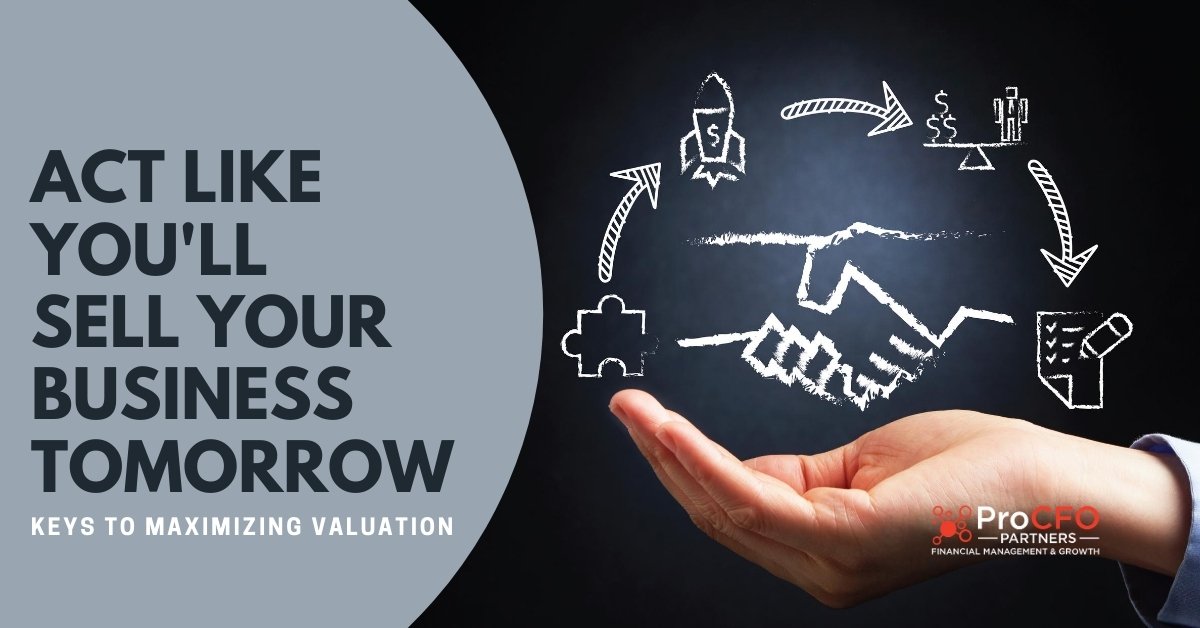How To Increase Company Valuation
Aug 20, 2020
If you’ve ever bought or sold your home, you know the stress of preparing. If you’re selling, there are walls to paint and blemishes to repair. People to hire to fix the broken hinges or replace the loose floorboards. If you’re readying to buy, you need your financial house in order. Strong bank relationships, managed debt, some money in the bank. In either situation it’s not uncommon to look at your ready-for-sale home or well organized bank accounts and think, I should’ve been doing this all along!
The analogy works for business transactions too. A transaction in business finance is anything as simple as a bank loan to as sophisticated as an investment or the sale or purchase of a company. And even if you’re not taking on investors or selling or buying a company, it pays to act like you might be. Let’s explore buying and selling your business.
Is it the right time to buy a company?
Acquisition can help your company grow into new territory, markets or demographics, expanding or solidifying what you offer. Acquisition can help a company grow more quickly than what organic growth could likely sustain. There are some key questions to ask when considering an acquisition as part of your goals and strategies:
- Is your industry situated for growth? Buying at the right time is key for long-term success.
- Is the supply and demand ratio sustainable for growth, so that an acquisition makes sense?
- Are you ready?
Are you ready to buy a company?
Acquisition is sometimes outside the forecasted strategic scope of the company. An opportunity arises, and it’s time to seriously consider it. This means you can’t just create readiness when the opportunity to buy a company presents itself – you have to constantly be ready for the opportunity. Your entire team, including leadership but extending to valuable partners, has to be aligned. Capital advisors, your law firm and legal teams, your accounting partners – everybody who plays critical functions for significant financial decisions has to prepared financially and strategically.
Failing to be prepared, or hurrying to be prepared, can slow down processes, aggravate stakeholders, frustrate processes and ultimately break deals. For an acquisition to fully integrate can sometimes take years, so what seems like a minor problem now can turn into a significant issue later. Be sure to consider:
- Owners of your company are prepared for the time horizons required for a successful acquisition.
- Your business is being run with max efficiency.
- The right people, processes, and management teams are in place, including banking and funding relationships.
Even if you operate from a place of consistent, constant preparedness for the right acquisition, remember the flip side of the transaction and its potential impact – the preparedness of the seller.
Should you sell your company?
Most businesses sell because the owner has decided it’s time. And just like when buying a company, some owners have created a strategic roadmap for a selling timeline while others simply reach the point when they know. And just like when buying a company, preparedness is crucial. The right CFO can help with the preparation process, starting with accurate financial statements but extending to strengthening processes and relationships that will make a company better equipped to have serious sales conversations anytime.
This again means a company should always be in a state of readiness, running at max efficiency and productivity. When you act like a company that’s ready to sell at any time, you know your strengths and weakness intimately. You know your numbers and KPI’s more often than annually or quarterly. You’ll be in a consistent state of self-evaluation, which can help you make smart decisions about all facets of your business. Over time this inevitably makes your company more valuable.
If you act like a business that’s ready to sell – even if you’re not considering it – you’ll be a better run business!
Avoiding Emergency Mode
Failure to prepare means when the time comes to buy or sell, you’ll be in a scramble to find the right partners, get your team on board, secure financing or have your house in order. When the large issues are problematic it’s impossible to be proactive, and if readiness isn’t there it can get very expensive or costly. Expensive in the investments you’ll have to suddenly make in processes, partnerships, or people when you could have been slowly building these things over time, and costly in the valuation that’s getting lost as your buyer starts discovering all of the inefficiencies and problems it’s potentially inheriting. At that point the entire transaction can be at risk.
The Driver For Transaction Is Valuation
Being prepared to sell, or to buy, and operating with that preparedness improves your valuation. Enlisting the right guidance before you’re ready to sell makes you ready to sell, as you can:
- Be confident your financial statements are correct
- Analyze your industry’s health
- Surround yourself with the right management team and financial partners
- See yourself as potential buyers see you, allowing you to be steadily proactive
Your CFO or the right fractional CFO should be equally prepared to deliver the guidance and analysis you need to sell or buy your business – or act like you could tomorrow.
Sign Up for Our Newsletter
Get expert perspectives and actionable strategies to empower your business growth.
"(Required)" indicates required fields


